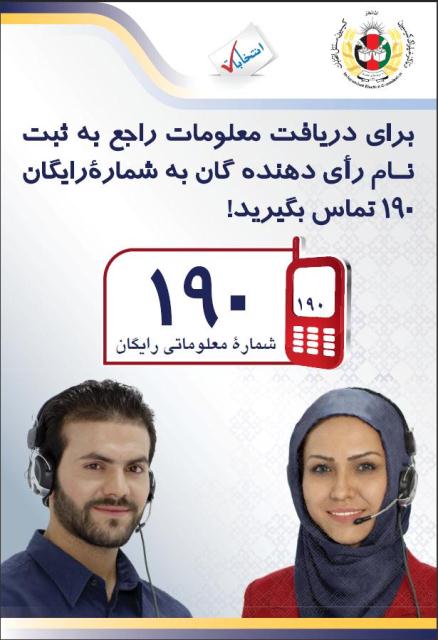KABUL - A United Nations-supported toll-free telephone hotline which provides “correct information” to the Afghan public on next year’s Presidential and Provincial Council elections has received some 155,000 calls since it began operations in mid-July, with an average of about 22,000 calls every week, according to Afghanistan’s election commission.
“The call centre has been most effective and helpful for people all over the country. Everyone can easily access to all information regarding elections,” an official of the Independent Election Commission (IEC), which operates the call centre, said in an email interview.
According to the IEC’s Information and External Relations Department, the week of 30 August to 5 September recorded the highest number of inquiries with 38,759 calls to the centre’s *190* telephone number.
A majority of the callers were from Kabul and Maidan Wardak provinces, in central Afghanistan, followed by the provinces of Herat, Kandahar, Nangarhar, Khost and Helmand. The centre received the least number of calls – just 57 – from Nuristan province, in the country’s east.
The IEC’s spokesperson, Noor Mohammad Noor, has previously described the call centre as “one of our biggest operations” in the lead up to next year’s polls since the country’s first presidential elections in 2004.
Afghanistan is slated to hold Presidential and Provincial Council elections on 5 April 2014. The United Nations Assistance Mission in Afghanistan (UNAMA) is mandated to support – at the request of the Afghan authorities – the organization of the elections as well as to strengthen, in support of the Government’s own efforts, the sustainability, integrity and inclusiveness of the electoral process and provide capacity building and technical assistance to the Afghan institutions involved in this process.
As well, the ELECT II (Enhancing Legal and Electoral Capacity for Tomorrow II) project of the UN Development Programme (UNDP) has been providing long-term assistance to the IEC, focussing on institutional strengthening and capacity development, with an overarching objective of supporting the national electoral institutions to plan and conduct credible elections with minimal external support, and to better ensure the integrity of the process. The establishment of the call centre is a part of the process.
At the height of the campaigning ahead of the last presidential election, in 2009, a similar call centre received up to 25,000 calls a week.
Data collected between 16 July this year – the day the call centre came into operation – and 5 September found that 93.5 per cent of the callers were men, with just over 10,000 women calling the centre.
Some of the questions asked by members of the public include: ‘Can the Taliban stand in the elections?’ ‘For which candidates can I vote?’ and ‘Can prisoners also vote?’ Other topics covered in the questions are election dates, the IEC’s structure, the voter registration process and locations, and information about election observers, according to a list of commonly-asked questions compiled by the IEC.
Members of insurgent groups, which have vowed to disrupt the elections, have also called the call centre hotline, albeit for a different reason: to threaten the call centre operators.
“We don’t accept the election process at all; this process is against Islam; we will destroy the IEC; we will not let the 2014 elections from happening,” an IEC official noted as being some of the things said by the insurgent callers.
Sixty call centre operators, split into two groups working in two different shifts, man the hotlines, responding in the Dari and Pashto languages from 7:00 a.m. to 8:00 p.m. every day.
Related links:
- Afghan election body starts telephone hotline to answer poll queries (17 July 2013)
- Elections hotline ringing non-stop (9 June 2009)






